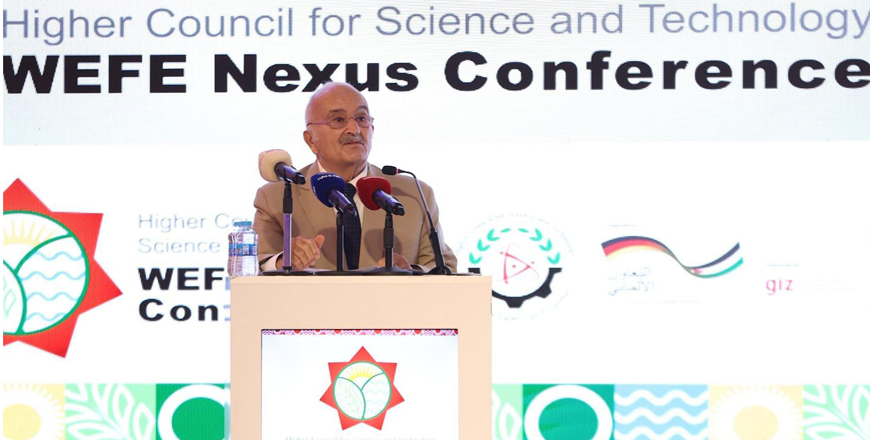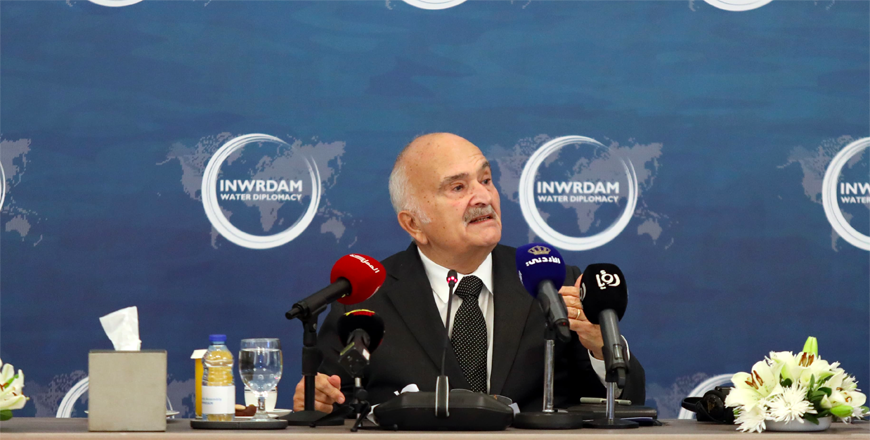You are here
Prince Hassan proposes creation of regional water, energy community for Mashreq countries
By Heba Elayyan , Maria Weldali - Oct 14,2024 - Last updated at Oct 14,2024

HRH Prince Hassan stresses the need for regional cooperation, proposing the creation of a regional water and energy community for Mashreq countries (Petra photo)
AMMAN — HRH Prince Hassan stressed the need for regional cooperation, proposing the creation of a regional water and energy community for Mashreq countries, modelled after the European Coal and Steel Community.
The prince's remarks came during the WEFE Nexus Conference, which was organised by the Higher Council for Science and Technology, with the support of the German International Cooperation (GIZ), and funded by the German Federal Ministry for Economic Cooperation and Development (BMZ).
German Ambassador to Jordan Bertram von Moltke and ministers of water and irrigation, environment, and energy and mineral resources attended the conference.
In his opening remarks, Prince Hassan, chairman of the Higher Council for Science and Technology, stressed the critical importance of WEFE Nexus in the Mashreq region.
He noted that this framework can foster cross-border cooperation, reduce competition over scarce resources, and promote mutual benefits.
The Prince stressed the importance of decision-making based on reliable data and absolute facts to ensure equitable stability and independence in the region.
He highlighted the need for integrating the WEFE nexus to serve human capital, making local communities key stakeholders in developing good governance.
"It is time for the people in our region to move from being mere followers to becoming active citizens," he said, underlining the necessity of collaboration across sectors to achieve effective governance of the WEFE Nexus.
Moltke stressed the deep interconnections between the four sectors, stressing that addressing challenges in one sector cannot be done in isolation from the others.
“If we are thinking about water, we must simultaneously consider energy, food, and the environment. These sectors rely on one another,” Moltke said, adding, “You cannot pump water for agriculture or household use without energy, and every step in this process has environmental consequences.”
He highlighted the crucial role of AI in managing these complex interconnections, particularly in a country like Jordan, where water availability is critically low. “While the global average is 500 cubic metres of water per capita, Jordan struggles with only 60 cubic metres."
Mashhour Refai, secretary general of the Higher Council for Science and Technology, echoed Prince Hassan’s and Moltke’s sentiments, noting that AI offers powerful tools for resource management, predicting future water demand, identifying leaks, and optimising energy use within smart grids.
By analysing data across sectors, AI enhances efficiency and sustainability in ways that traditional methods cannot, he said.
He also pointed to AI's potential in revolutionising food production through precision farming, using data from sensors and advanced equipment to optimise crop management, predict weather patterns, and assess soil and plant health.
Refai said that the conference aimed to strengthen cooperation between the WEFE sectors, exchange best practices for integrated solutions, and highlight the role of AI, the Internet of Things, and renewable energy integration in achieving sustainable development.
Related Articles
AMMAN — HRH Prince Hassan, chairman of the Higher Council for Science and Technology, on Tuesday attended the launch of the 3rd edition of t
AMMAN — HRH Prince Hassan, chairman of the Higher Council for Science and Technology (HCST), on Tuesday inaugurated the 36th Forum of the Is
AMMAN — What started as an abstract concept for turning water from a potential cause of war to a driver of peace over a decade ago grew into














